| Srl | Item |
| 1 |
ID:
136982
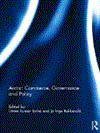

|
|
|
|
|
| Publication |
Oxon, Routledge, 2015.
|
| Description |
viii, 164p.Hbk
|
| Standard Number |
9781138855991
|
|
|
|
|
|
|
|
|
|
|
|
Copies: C:1/I:0,R:0,Q:0
Circulation
| Accession# | Call# | Current Location | Status | Policy | Location |
| 058161 | 320.09113/SIN 058161 | Main | On Shelf | General | |
|
|
|
|
| 2 |
ID:
122075
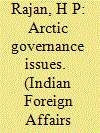

|
|
|
| 3 |
ID:
126374
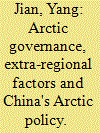

|
|
|
| 4 |
ID:
104179
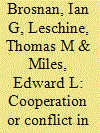

|
|
|
|
|
| Publication |
2011.
|
| Summary/Abstract |
The possibility of conflict among nations has dominated discussions of the future of the Arctic. Are there no opportunities for cooperation? This article explores the avenues and incentives for Arctic cooperation through the common issues outlined in the strategy statements of the five coastal Arctic states. Incentives to cooperate can be found in all the thematic areas examined: sovereignty, scientific research, resource development, shipping, and environmental concerns. Cooperation is already occurring on some salient issues. Additional cooperation may occur as issues become increasingly pressing. From this perspective, Arctic conflict is by no means inevitable. Numerous avenues for cooperation exist.
|
|
|
|
|
|
|
|
|
|
|
|
|
|
|
|
| 5 |
ID:
190127
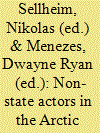

|
|
|
|
|
| Publication |
Switzerland, Springer, 2022.
|
| Description |
xvi, 326p.hbk
|
| Series |
Springer Polar Sciences
|
| Standard Number |
9783031124587
|
|
|
|
|
|
|
|
|
|
|
|
Copies: C:1/I:0,R:1,Q:0
Circulation
| Accession# | Call# | Current Location | Status | Policy | Location |
| 060351 | 355.0335/SEL 060351 | Main | On Shelf | Reference books | |
|
|
|
|
| 6 |
ID:
159855
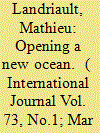

|
|
|
|
|
| Summary/Abstract |
This policy brief focuses on the opening of the Central Arctic Ocean and the subsequent questions this poses to regional governance. This change has the potential to radically alter the nature of Arctic governance as non-Arctic states will have to play a significant role in the rules that will apply in the Arctic high seas. Talks about a regional fisheries regime will define the future of this region. The creation of a coordinating agreement would have the benefit of not challenging Arctic states too fundamentally while at the same time incorporating non-Arctic states in a meaningful way in the regional governance infrastructure.
|
|
|
|
|
|
|
|
|
|
|
|
|
|
|
|
| 7 |
ID:
143341
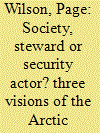

|
|
|
|
|
| Summary/Abstract |
While a long-term decrease in overall Arctic sea ice extent has been recorded by the US National Snow and Ice Data Center (2014) since the late 1970s, the unprecedented levels of ice melting and thinning experienced in the region in 2007, and subsequently in 2012, have brought the Arctic once again to the forefront of international affairs. Much popular and academic attention has focused on whether the Arctic is likely to remain a zone of cooperation, or descend into conflict. However, less attention has been paid to examining the evolution and role of fora in the region, such as the Arctic Council. In this paper, it is argued that three visions are presently shaping ways of thinking about the Council: the first envisages the Council as a society for Arctic states; the second sees the Council as a steward for the Arctic; and the third imagines the Council as a fully-fledged security actor. The extent to which each vision is manifested in the practices of the Council and its members is also examined. Finally, the paper considers what the ongoing tensions within and among these three ways of conceptualising the Council means for its future prospects, and for Arctic politics more generally.
|
|
|
|
|
|
|
|
|
|
|
|
|
|
|
|